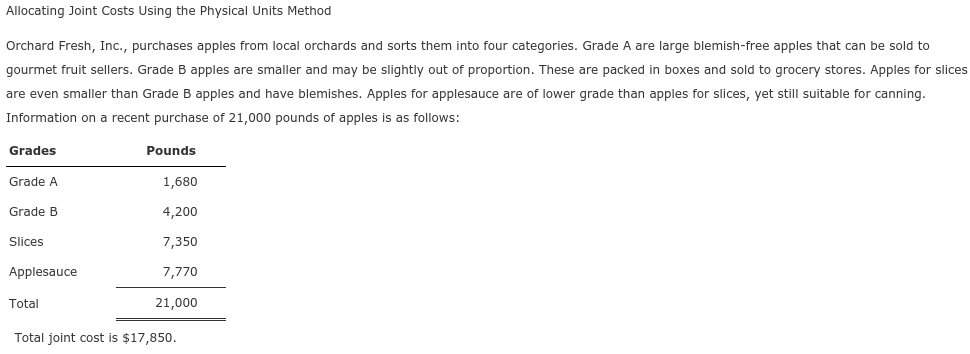Answered step by step
Verified Expert Solution
Question
1 Approved Answer
Please answer CORRECTLY. Allocating Joint Costs Using the Physical Units Method Orchard Fresh, Inc., purchases apples from local orchards and sorts them into four categories.




Please answer CORRECTLY.
Allocating Joint Costs Using the Physical Units Method Orchard Fresh, Inc., purchases apples from local orchards and sorts them into four categories. Grade A are large blemish-free apples that can be sold to gourmet fruit sellers. Grade B apples are smaller and may be slightly out of proportion. These are packed in boxes and sold to grocery stores. Apples for slices are even smaller than Grade B apples and have blemishes. Apples for applesauce are of lower grade than apples for slices, yet still suitable for canning. Information on a recent purchase of 21,000 pounds of apples is as follows: Total joint cost is $17,850. 1. Allocate the joint cost to the four grades of apples using the physical units method. 2. Allocate the joint cost to the four grades of apples by finding the average joint cost per pound and multiplying it by the number of pounds in the grade. Round the average cost answer to the nearest cent. Average cost =$ per pound. 3. What if there were 2,100 pounds of Grade A apples and 3,780 pounds of Grade B? How would that affect the allocation of cost to these two grades? How would it affect the allocation of cost to the remaining common grades? Allocating Joint Costs Using the Physical Units Method Orchard Fresh, Inc., purchases apples from local orchards and sorts them into four categories. Grade A are large blemish-free apples that can be sold to gourmet fruit sellers. Grade B apples are smaller and may be slightly out of proportion. These are packed in boxes and sold to grocery stores. Apples for slices are even smaller than Grade B apples and have blemishes. Apples for applesauce are of lower grade than apples for slices, yet still suitable for canning. Information on a recent purchase of 21,000 pounds of apples is as follows: Total joint cost is $17,850. 1. Allocate the joint cost to the four grades of apples using the physical units method. 2. Allocate the joint cost to the four grades of apples by finding the average joint cost per pound and multiplying it by the number of pounds in the grade. Round the average cost answer to the nearest cent. Average cost =$ per pound. 3. What if there were 2,100 pounds of Grade A apples and 3,780 pounds of Grade B? How would that affect the allocation of cost to these two grades? How would it affect the allocation of cost to the remaining common gradesStep by Step Solution
There are 3 Steps involved in it
Step: 1

Get Instant Access to Expert-Tailored Solutions
See step-by-step solutions with expert insights and AI powered tools for academic success
Step: 2

Step: 3

Ace Your Homework with AI
Get the answers you need in no time with our AI-driven, step-by-step assistance
Get Started


